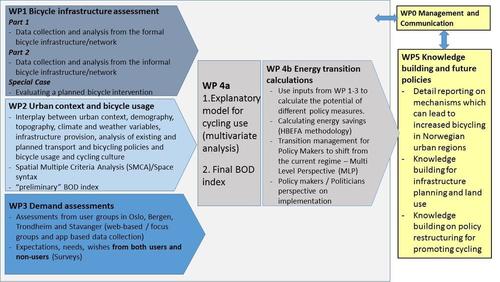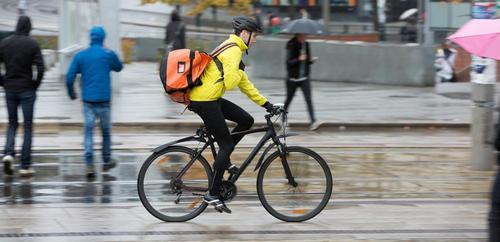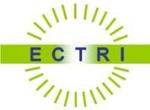 CYCLE-TO-ZERO is envisioned to be multi-disciplinary through combining theories and data anchored in infrastructure planning, energy, economics, urban/transport planning and political science. The project is supported by Norwegian Research Council through its Energy Research Programme ENERGI-X (project no. 255628). The city of Oslo, Bergen, Trondheim and Stavanger will be studied in detail in this project.
CYCLE-TO-ZERO is envisioned to be multi-disciplinary through combining theories and data anchored in infrastructure planning, energy, economics, urban/transport planning and political science. The project is supported by Norwegian Research Council through its Energy Research Programme ENERGI-X (project no. 255628). The city of Oslo, Bergen, Trondheim and Stavanger will be studied in detail in this project.
The following overall research question (RQ) will guide the work:
RQ (main topic guiding all WPs):
How can we explain bicycling in Norwegian urban areas, the spatial variation as well as the temporal; How can a rapid expansion be triggered? Does the current Norwegian bicycle infrastructure encourage or discourage bicycling? Is the current extent and quality level of infrastructure provision in alignment with the requirements of different groups?
RQ1:
a) What is the quantity and quality of the bicycle infrastructure (for both formal and informal paths/routes that cyclists use) in Oslo, Bergen, Trondheim, and Stavanger?
b) What is the relative preference for the specified set of infrastructure attributes, and how does it differ among segments of actual and potential cyclists?
RQ2:
How does the topography and climate factors relate to the individual choice of bicycling?
RQ3:
What elements of the urban design and land-use can be quantified, together with (local) energy/transport policies?
RQ4:
What are the energy implications of a radical modal shift to bicycling, radical yet realistic given the right policy mix? How can energy transition towards increased bicycling take place in Norway?
The project is structured in the five primary work packages, as highlighted in the following schematic drawing:

A PhD thesis, overlapping all the 5 Work Packages, is also under progress. The ongoing tasks for each work package is highlighted in the following points:
WP1: Ongoing tasks. March 2018.
- Experiment to measure the effects of road surface on the subjective experience and valuation by cyclists.
WP2: Ongoing tasks. March 2018.
- Critical analysis of policy datasets from the different city regions, along with analysis of urban policies and position of bicycling in policy packages.
- Use of INMAP model to plot the accessibility of different parts of the city (for all 4 case cities) by cycling (both normal and el-cycle).
- Survey with policy makers.
WP3: Completed and Ongoing tasks. March 2018.
- Develop and carry out web-surveys in Oslo, Bergen, Trondheim and Stavanger (Completed task).
- Data collection among participants with mobile app (Completed task).
- Descriptive analyses of the data collected through sense.dat app and survey (Completed task).
- Second round of data collection through sense.dat planned for May 2018 (ongoing task).
WP4: Ongoing tasks. March 2018.
- Building a composite explanatory model explaining the mode share by bicycle in the 4 case cities.
Expert Group:
Marco te Brommelstroet, Urban Cycling Institute, Centre for Urban Studies, University of Amsterdam
Tor Medalen, Department of Urban Design and Planning, Norwegian University of Science and Technology
Eva Heinen, Centre for Transport Studies, University of Leeds
Saskia Kluit, Fietsersbond
Per Gunnar Røe, Department of Sociology and Human Geography, University of Oslo
Yamini Jain Singh, PlanIT
Reference Group:
Siv Linette Grann, Sykkelprosjektet, Oslo kommune
Ivar Arne Devik, Trondheim Kommune Byutvikling
Anne Ogner, Norwegian Public Roads Administration
Rannveig Maria Johannesdottir, Rogaland Fylkeskommune
Morgan Andersson, Norwegian cyclist´s association
Claudio D'Eugenio, Avdeling for samferdsel og transport, Akershus fylkeskommune
Christin Berg, City Development, Stavanger Kommune
Publications







